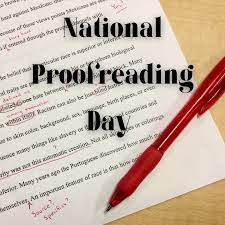National Proof Reading Day
By Sharon Schweitzer
U.S. National Proofreading Day is celebrated annually on March 8th. This day is dedicated to promoting and encouraging error-free writing. The aim of this day is to raise awareness about the importance of proofreading and to encourage everyone to take the time to ensure that their writing is free of spelling and grammar errors.
In 2011, Judy Beaver created National Proofreading Day in remembrance of her mother, Flo. On her website (nationalproofreadingday.com) Judy relates that her mother loved to correct people. She thought by creating the day on her mother’s birthday it would be a fun way to remember her, and help people take more time to proof read their work!
Ms. Beaver has filled her website with links to many resources that relate to proofreading, but also for grammar as well. It is important to remember that when we write, we should use the rules of grammar instead of typing as if we are speaking.
Proofreading is an important step in the writing process. It can help to improve the quality of your work and ensure that your message is conveyed clearly and effectively.
In the real world, mistakes in purchase orders and advertising can have real consequences. And no one knows this better than NASA. In 1962, they lost contact with Mariner 1 and eventually lost control of it. This resulted in them having to blow it up 293 seconds after launch. What caused them to lose control? Some people believe it was a missing hyphen in the spacecraft’s guidance code. Science fiction writer Arthur C. Clarke dubbed this mistake as one of the most expensive hyphens in history.
The job of the proofreader is to go carefully through documents and spot formatting and typography errors in the text. In contrast to a copy editor, who can fine-tune the text themselves after spotting errors, a proofreader is expected to send the text back to the writer or the editor for making corrections.
English is a complicated language and nothing demonstrates this more than the homophone. Those words that sound the same but have different meanings or spellings (for example, taught and taut), escape the word processor’s spellcheck if they are spelled correctly. However, they may be used in the wrong context as a computer can’t pick up on the nuances of meaning. This is just one example of why the human proofreader is invaluable.
In recent years, with the emergence of word processing and typesetting software, the proofreading profession has undergone a sea change. Today, proofreaders do not need to use old-fashioned symbols to indicate errors – they can highlight errors right within the electronic text. New proofreading software has also cut down the time a proofreader needs to spend on a text.
Photo by https://www.bedazzledink.com
Sharon Schweitzer JD, is a diversity and inclusion consultant, cross-cultural trainer, etiquette expert, and the founder of Access to Culture. In addition to her accreditation in intercultural management from the HOFSTEDE Centre, she is an attorney and mediator. Sharon served as a Chinese Ceremonial Dining Etiquette Specialist in the documentary series Confucius was a Foodie, on Nat Geo People. Her Amazon #1 Best Selling book in International Business, Access to Asia: Your Multicultural Business Guide, won a coveted Kirkus Star, and was named to Kirkus Reviews’ Best Books. She’s a winner of numerous awards, including the British Airways International Trade Award at the Greater Austin Business Awards.
#SharonSchweitzer, #AccesstoCulture, Access2Culture, #InternationalCelebration, #AccesstoAsia, #GlobalEtiquette, #Cross-CulturalTrainer, #InterculturalCommunication, #InternationalCommunication, #Interculturalist, #Etiquette, #CultureExpert, #Speaker, #KeynoteSpeaker, #NationalProofReadingDay, #JudyBeaver, #NASA, #Grammar, #Writing


Leave A Comment